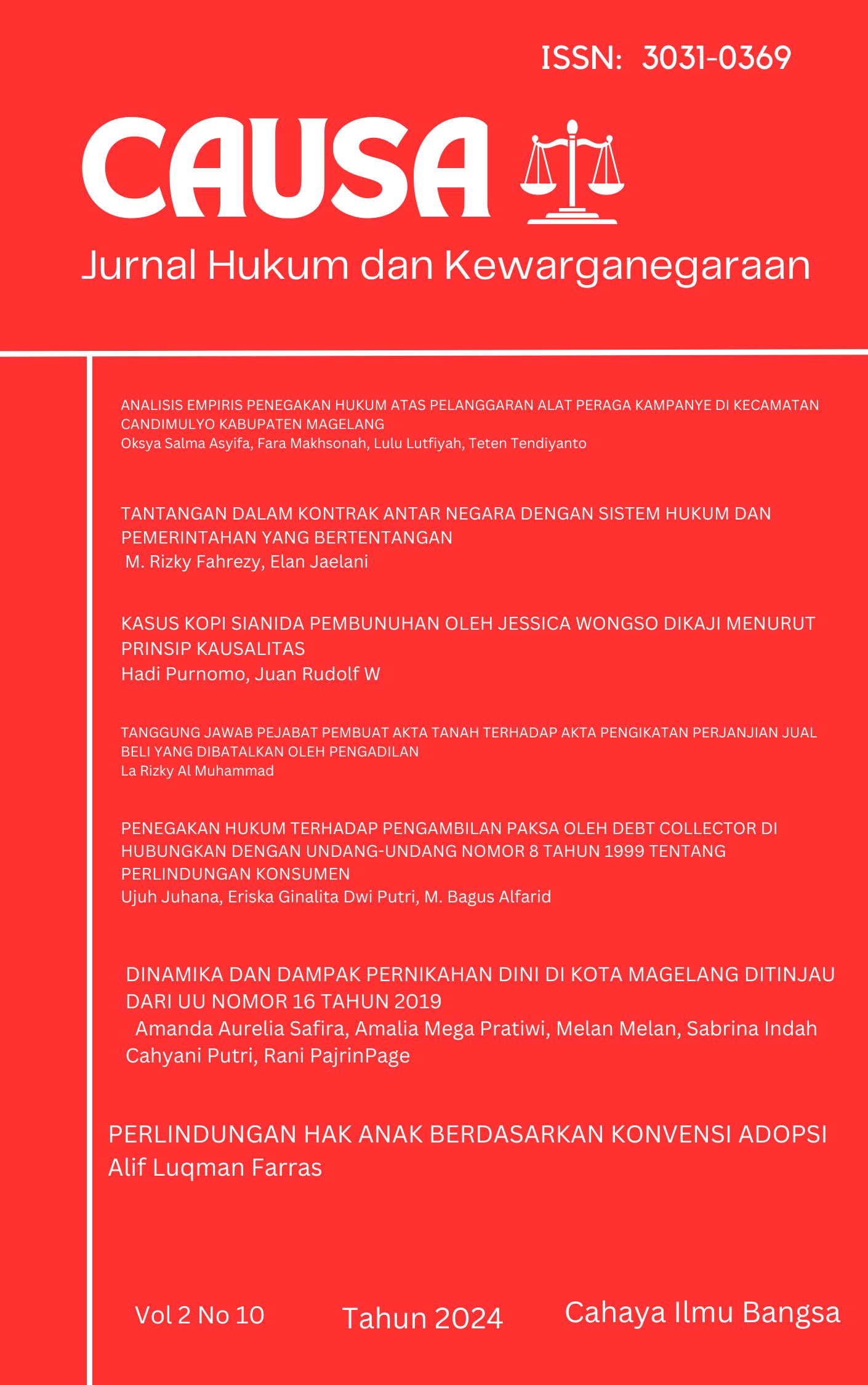TANTANGAN DAN PROSPEK STANDARISASI HALAL INDONESIA DI ERA GLOBALISASI
- Authors
-
-
Dina Angelina
Manajemen, Fakultas Ekonomi, UIN Maulana Malik Ibrahim MalangAuthor -
Romi Faslah
Manajemen, Fakultas Ekonomi, UIN Maulana Malik Ibrahim MalangAuthor
-
- Keywords:
- Halal Standardization, Globalization, Certification, Halal Industry
- Abstract
-
Halal standardization is crucial to ensure the availability of reliable halal products, including raw materials, production processes, and distribution in accordance with Islamic law. The Indonesian government has strengthened regulations through the establishment of the Halal Product Guarantee Agency (BPJPH) to manage the Halal Product Guarantee (JPH) program.
Although the global market potential is huge and the halal industry plays an important role in the national economy, there are several challenges that need to be overcome. These challenges include a lack of public understanding of halal standardization, the complexity of the certification process, differences in global halal standards, challenges for MSMEs, and inadequate regulations.
The prospect of halal standardization in the era of globalization is very bright, supported by the potential of a large global market, an important role in the national economy, strengthening regulations and infrastructure, product innovation, and increasing awareness and education. The case studies of PT Indofood CBP Sukses Makmur Tbk and Wardah Cosmetics show that with the right strategies, such as obtaining comprehensive halal certification, implementing a Halal Assurance System (HAS), and innovating, local companies can successfully penetrate the global market and strengthen Indonesia's brand image. By overcoming the existing challenges, Indonesia has great potential to become a key player and trend-setter in the global halal industry.
- Downloads
- Published
- 2025-06-04
- Section
- Articles
How to Cite
Most read articles by the same author(s)
- Ainul Lutfiyah, Romi Faslah, STANDARISASI HALAL SEBAGAI KEUNGGULAN KOMPETITIF INDUSTRI HALAL GLOBAL , Causa: Jurnal Hukum dan Kewarganegaraan: Vol. 13 No. 7 (2025): Causa: Jurnal Hukum dan Kewarganegaraan
- Aditya Gilang Rifai, Romi Faslah, TINDAK PIDANA PENCUCIAN UANG DALAM PERSPEKTIF HUKUM POSITIF DAN ISLAM: ANALISIS TEORETIS DAN STUDI KASUS DI INDONESIA , Causa: Jurnal Hukum dan Kewarganegaraan: Vol. 14 No. 5 (2025): Causa: Jurnal Hukum dan Kewarganegaraan
Similar Articles
- Ainul Lutfiyah, Romi Faslah, STANDARISASI HALAL SEBAGAI KEUNGGULAN KOMPETITIF INDUSTRI HALAL GLOBAL , Causa: Jurnal Hukum dan Kewarganegaraan: Vol. 13 No. 7 (2025): Causa: Jurnal Hukum dan Kewarganegaraan
- Zahra Melati Kasmayadi, Radja Ghifari Dirgantara, PERLINDUNGAN HUKUM KONSUMEN TERHADAP SERTIFIKASI HALAL:PERILAKU PEDAGANG SATE NAKAL BERBAHAN DASAR B2 , Causa: Jurnal Hukum dan Kewarganegaraan: Vol. 15 No. 3 (2025): Causa: Jurnal Hukum dan Kewarganegaraan
- Dimas Ananda Saputro, Widhi Cahyo Nugroho, PERLINDUNGAN HUKUM TERHADAP PELANGGARAN HAK CIPTA DALAM PENGUBAHAN MUSIK MENJADI MUSIK REMIX , Causa: Jurnal Hukum dan Kewarganegaraan: Vol. 15 No. 3 (2025): Causa: Jurnal Hukum dan Kewarganegaraan
- Lazarus Katy Kole, PERLINDUNGAN HUKUM TERHADAP MEREK DAGANG DALAM ERA GLOBALISASI , Causa: Jurnal Hukum dan Kewarganegaraan: Vol. 15 No. 8 (2025): Causa: Jurnal Hukum dan Kewarganegaraan
- Naya Zaqlina, Irma Septantri, Muhammad Saqif Hasbullah, Suryaningsi Suryaningsi, IDENTITAS NASIONAL: PENJAGA KEUTUHAN DAN KEBANGGAAN BANGSA , Causa: Jurnal Hukum dan Kewarganegaraan: Vol. 14 No. 4 (2025): Causa: Jurnal Hukum dan Kewarganegaraan
- Najwa Rahmania, Desthia Salwa, Yulia Astuti, Suryaningsi Suryaningsi, PENGARUH SIKAP INDIVIDUALISME TERHADAP IMPLEMENTASI NILAI FALSAFAT PANCASILA DI ERA MODERN MASYARAKAT INDONESIA , Causa: Jurnal Hukum dan Kewarganegaraan: Vol. 13 No. 11 (2025): Causa: Jurnal Hukum dan Kewarganegaraan
- Ananda Bunga Neesya, Fedya Batara Trisya Sukmana, Suci Aulia, Vega Febriana, Nandang Kusnadi, TINJAUAN YURIDIS TERHADAP SYARAT KEABSAHAN PERJANJIAN DALAM HUKUM KONTRAK INDONESIA , Causa: Jurnal Hukum dan Kewarganegaraan: Vol. 14 No. 9 (2025): Causa: Jurnal Hukum dan Kewarganegaraan
- Rizki Arrohman, KEPAILITAN TRANSNASIONAL: STUDI KOMPARATIF INDONESIA DAN MALAYSIA DALAM ERA GLOBALISASI HUKUM , Causa: Jurnal Hukum dan Kewarganegaraan: Vol. 15 No. 1 (2025): Causa: Jurnal Hukum dan Kewarganegaraan
- Junaedi Hasyim, Suhufi, Misbahuddin, KONFLIK DAN KETEGANGAN DALAM HUKUM ISLAM: ANTARA IDEALISME DAN REALISASI , Causa: Jurnal Hukum dan Kewarganegaraan: Vol. 15 No. 3 (2025): Causa: Jurnal Hukum dan Kewarganegaraan
- Angela Marlina, Ahmad M. Ramli, Ranti Fauza Mayana, EKSISTENSI OPOSISI DAN TRANSPARANSI PUTUSAN PEMERIKSAAN SUBSTANTIF MEREK DAGANG SEBAGAI LANGKAH PREVENTIF PEMALSUAN MEREK BERDASARKAN HUKUM POSITIF DI INDONESIA , Causa: Jurnal Hukum dan Kewarganegaraan: Vol. 15 No. 8 (2025): Causa: Jurnal Hukum dan Kewarganegaraan
You may also start an advanced similarity search for this article.

